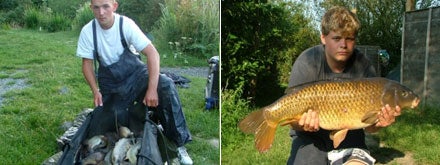Engaging young people – the life blood of our sportFor a number of years many different organisations involved in angling, both at a national and local (club) level, have realized that compared to 30 or 40 years ago, the average angler’s age has increased, and that there are noticeably fewer young people participating in our sport. As a result of this a number of initiatives and projects have been instigated, to encourage young people back into it sport. Prior to 2003 the success or failure of these projects had always depended on the enthusiasm and dedication of the organisers and their helpers, the amount of funding available, and the quality of the instruction they were providing. The sustainability of these programmes was difficult enough, especially from the funding point of view, as fishing is not a high priority sport for receiving assistance. If things were not complicated enough, nowadays, the organisers and volunteers of such projects have to undergo enhanced disclosure checks, have a Child Protection Policy in place, have First Aid and Water Safety qualified instructors present, and risk assessments for every situation you can imagine. Is it any wonder that so many people in our sport who are concerned about its future, become disheartened and take the easier option, to do nothing. We are fortunate that the governing bodies of our sport are not disheartened by this challenge and that they are making very positive steps to engage young people and introduce them to fishing. There are a number of organisations like the one I represent that are also assisting in this process of actively engaging young people and teaching them to fish. Angling for Youth Development, is a non profit making initiative operated by Scottish Police Forces and Public sector agencies and are in partnership with voluntary sector organizations. They are also supported by the Scottish Angler’s National Association (SANA).   It was started by Strathclyde Police as they identified a need to find a medium to engage with young people at a number of levels. We are not an organization, just interested in “rehabilitation of offenders”, but cater for young people of all backgrounds and abilities. Why are the Police and Local Government involved in this project? We have found that there are a number of areas within the sport that can positively influence an individual’s personal development and provide additional opportunities and benefits within communities as well. Angling in all its forms is a great ‘leveler’, because it builds bridges across social and economic divides. It can help develop a young person’s motivation, skills, self confidence, social care, personal enterprise, and promote physical exercise and good health. It can also lead to the development of a more responsible lifestyle. It is a useful educational tool, in that the sport calls for knowledge of science, geology, geography, natural and social history. It can provide employment opportunities and assist in a community’s economic growth. Angling can also address social problems by reducing crime, truancy, and anti-social behaviour, thereby helping to create safer and more caring communities. It can be a positive, pro-active, and creative force for the improvement of both our social and natural environments. When it comes to obtaining grant funding and other support for our programme we have found that reasons why we are running it are the very reasons that grant funding bodies are looking for to justify their outlay. Because our programme is based very much in the public sector it has been designed to be an educational and vocational training tool, and whilst our programmes are very much angling based, we offer courses aimed a young people that consist of:
When we approached SANA they gave us every assistance and have even provided our course work with a forward (extract as follows) “To say we are impressed with the thoughtful and intelligent way this initiative has been developed and extended into five courses, covering both primary and secondary education, would be an understatement. The authors of this much enlarged and improved initiative, are to be commended for their production of an excellent vocational programme, which will, without any doubt, improve not only the quality of life of our youth, but enable them to gain the knowledge and experience to increase their potential and acquire the necessary skills to smooth their journey through their early years”. James R. Picken, We have found that our courses are offering many benefits to individuals and our communities, rather than just teaching kids to fish. Detailed below are just a few of them!
I hope that this article is of interest to you and your readers and that other individual’s and organisations can elicit some information from it that encourages them to become more active in our sport. Whilst it can be great fun just going fishing it can be so much more rewarding helping young people catch their first fish. I think the looks on their faces at that point says it all. Greville Humphey |
Welcome!Log into your account










